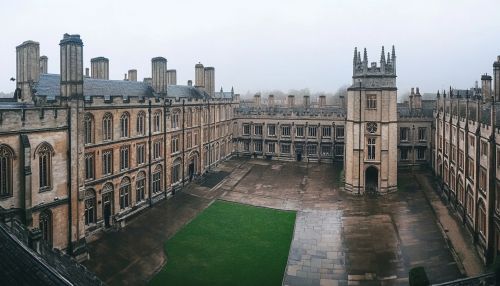Corpus Christi College
History
Corpus Christi College is one of the constituent colleges of the University of Cambridge, founded in 1352. It holds the distinction of being the only college in Cambridge established by the townspeople themselves, specifically by the Guild of Corpus Christi and the Guild of the Blessed Virgin Mary. The college was founded during a period of significant growth and development in the university, which was becoming a center of learning and scholarship in medieval Europe.
The college's early history is marked by its modest beginnings, with initial endowments and resources being relatively limited compared to other colleges. However, over the centuries, Corpus Christi College expanded its holdings and influence, becoming a vital part of the university's academic and social fabric. The college's statutes were initially modeled on those of Peterhouse, the oldest college in Cambridge, reflecting the interconnected nature of the university's early institutions.
The college's library, known as the Parker Library, is one of its most significant assets. It houses an extensive collection of medieval manuscripts, many of which were donated by Matthew Parker, a former Archbishop of Canterbury and Master of the college. This collection is invaluable for the study of medieval history, theology, and literature.
Architecture
Corpus Christi College is renowned for its architectural heritage, which reflects the various phases of its development. The college's main site is located on Trumpington Street, in the heart of Cambridge. The Old Court, the original quadrangle, dates back to the 14th century and is one of the oldest surviving courts in Cambridge. Its design is typical of medieval collegiate architecture, with a central courtyard surrounded by buildings housing the chapel, hall, and student accommodations.


The college chapel, completed in the late 14th century, is a fine example of Gothic architecture. It features a richly decorated interior, with stained glass windows and intricate woodwork. The chapel has undergone several restorations over the centuries, preserving its historical character while accommodating the needs of a modern academic community.
The New Court, constructed in the early 19th century, represents a significant expansion of the college's facilities. Designed in the Neo-Gothic style, it complements the older structures while providing additional space for students and fellows. The New Court's design reflects the 19th-century revival of interest in medieval architecture, which was part of a broader cultural movement in Britain at the time.
Academic Life
Corpus Christi College is known for its strong academic tradition, offering a wide range of undergraduate and graduate programs. The college has a reputation for excellence in the humanities, particularly in fields such as history, English literature, and theology. However, it also supports robust programs in the sciences and social sciences, reflecting the interdisciplinary nature of modern scholarship.
The college's tutorial system is central to its academic life, providing students with personalized instruction and mentorship. Tutors, who are often fellows of the college, guide students through their studies, helping them to develop critical thinking skills and a deep understanding of their chosen fields. This system fosters a close-knit academic community, where students and faculty engage in rigorous intellectual exchange.
Corpus Christi College also supports a vibrant research culture, with fellows and graduate students conducting cutting-edge research across a wide range of disciplines. The college hosts regular seminars, lectures, and conferences, providing opportunities for scholars to present their work and engage with colleagues from around the world.
Student Life
Student life at Corpus Christi College is characterized by a rich array of extracurricular activities and traditions. The college's student union, known as the Corpus Christi College Students' Union (CCSU), organizes social events, sports competitions, and cultural activities throughout the year. These activities provide students with opportunities to relax, socialize, and develop skills outside the classroom.
The college is home to several student societies, catering to a wide range of interests. The Corpus Christi College Boat Club, for example, is one of the oldest rowing clubs in Cambridge, with a long history of participation in the annual Boat Race against Oxford University. Other societies focus on music, drama, debating, and various academic pursuits, reflecting the diverse interests of the student body.
One of the college's most cherished traditions is the annual May Ball, a lavish event held at the end of the academic year. The May Ball features live music, entertainment, and fine dining, attracting students, alumni, and guests from across the university. It is a highlight of the social calendar and a celebration of the college's vibrant community.
Alumni and Legacy
Corpus Christi College has produced a number of notable alumni who have made significant contributions to various fields. Among them is Christopher Marlowe, the renowned playwright and poet, whose works have had a lasting impact on English literature. Other distinguished alumni include John Fletcher, a prominent dramatist of the Jacobean era, and Thomas Herring, a former Archbishop of Canterbury.
The college's legacy extends beyond its alumni, as it has played a crucial role in the intellectual and cultural life of Cambridge and the wider world. Its commitment to academic excellence, combined with its rich history and traditions, has made it a respected institution within the University of Cambridge.
